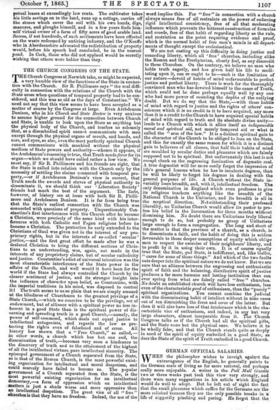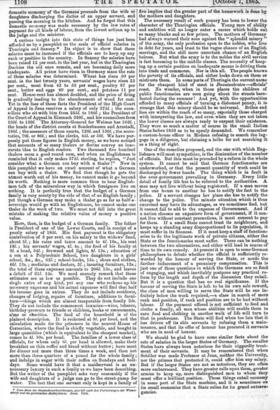GERMAN OFFICIAL SALARIES.
WHEN the philosopher wishes to inveigh against the extravagance of the English, he generally points to the German scale of living as far more rational, and perhaps really more enjoyable. A writer in the Pall Mall Gazette two or three weeks past took this view very strongly, and there wero many suggestions in his article which England would do well to adopt. But he left out of sight the fact that the small pleasures which suffice for the Germans are the more relished because they are the only possible breaks in a life of niggardly pinching and paring. He forgot that the
domestic economy of the German& proceeds from the wife or daughters discharging the duties of an upper servant, and passing the morning in the kitchen. And he forgot that this domestic economy was made necessary by the low rates of payment for all kinds of labour, from the lowest adman up to the judge and the minister.
A curious insight into this state of things has just been afforded ns by a pamphlet on the scale of official salaries in Thuringia and Saxony.* Its object is to show that these salaries must be increased if the officials are to keep up any rank or position in the country. In Saxony the salaries have been raised 12 per cent. in the last year, but in the Thuringian Duchies the old ones remain, and are becoming daily more inadequate. All prices have risen in Germany since the rate of these salaries was determined. Wheat has risen 50 per cent. in the last twenty years, servants' wages have risen 25 per cent., meat from 42 to 53 per cent., poultry 87 per cent., butter and eggs 40 per cent., and potatoes 11 per cent. House-rent has almost doubled, and the price of firing is gradually leading to the abandonment of wood for coal. Yet in the face of these facts the President of the High Court of Appeal in Jena receives a salary of only 3751. ; the coun- sellors who sit with him from 2551. to 180/. ; the President of the Court of Appeal in Eisenach 3301., and his counsellors from 1601. to 1501. The Attorney-General for Weimar has 1601. ; the heads of the district courts at Sonderhausen and Arnstadt, 180/. ; the assessors of those courts, 1201. and 150/. ; the secre- taries, 701. or 801.; and the clerks, 451. or 501. We have pur- posely put these figures in English money, as we have notified that accounts of so many thalers or florins convey an inac- curate idea to English readers. Two thousand five hundred thalers seem a good round sum, and when an Englishman is reminded that it only makes 3751. sterling, he replies, "Just consider what a German can buy with a thaler !" Now in this pamphlet we have an exact account of what a German can buy with a thaler. We find that though he gets the utmost worth out of his money, he cannot make it go beyond its worth. Nothing is more common than to hear English- men talk of' the miraculous way in which foreigners live on nothing. It is perfectly true that the budget of a German family is very scanty by the side of that of an English family ; yet though a German may make a thaler go as far as half-a• sovereignwould go with an Englishman, he cannot make one thaler do the work of two. We must not fall into the great mistake of making the relative value of money a positive value.
Here, then, is the budget of a German family. The father is President of one of the Lower Courts, and in receipt of a yearly salary of 1851. His first payment is the obligatory contribution of 3 per cent. on his salary to the widows' fund, about 5/. ; his rates and taxes amount to 4/. 10s., his rent 18/. ; his servants' wages, 41. 4s. ; the food of his family at 91. a head, 541. ; firewood and lights, 8/. 13s.; education of a son at a Polytechnic School, two daughters in a girls' school, &o., &c., 621.; school-books, 15s. ; shoes and clothes, 461. 13s. ; medicine and doctors, 31. ; insuring furniture, 13s.; the total of these expenses amounts to 2061. 13s., and leaves a deficit of 211. 13s. We need scarcely remark that these estimates are as low as possible. They do not include one single extra of any kind, yet any one who reckons up his necessary expenses and his actual expenses will find that half his income goes in extras. They do not include accidents, changes of lodging, repairs of furniture, additions to furni- ture-things which are almost inseparable from family life. They do not include the commonest luxuries-wine, tobacco, birthday-presents to friends or children, books or amusements, alms or charities. The food of the household is of the plainest description. It is reckoned at 91. per head, and the calculation made for the prisoners in the nearest House of Correction, where the food is chiefly vegetable, and bought in large quantities (which is equivalent to the cheapest market), comes to 41. 10s. per head. The families of a lower class of officials, for whom only 61. per head is allowed, make their breakfast on thin coffee and bread without butter ; have meat for dinner not more than three times a week, and then not more than three-quarters of a pound for the whole family ; and indulge in sugar with their coffee on Sundays and holi- days. Some would have it that a maidservant is an un- necessary luxury in such a family as we hays been describing. But the writer of the pamphlet asks very reasonably if the wife and daughters of a judge can go to the street-pump for water. The tact that one servant only is kept in a family of
• Dais Mau der Staatidienerbesoldungen, gepriVt nach den Forderungen der Wissen• adult and des praktischin Deddrjniaw. Jeua leab.
five implies that the greater part of the housework is done by the mothers and daughters.
The necessary result of such penury has been to lower the- character of the Thuringian officials. Young men of ability and ambition will no longer enter a career which holds out so many blanks and so few prizes. The mothers of Germany had always warned their sons against the " splendid misery ' of the army, the only profession open to the nobles, who live in debt for years, and trust to the vague chance of an English marriage, and the still more uncertain chance of an English• heiress. But what the army is to the nobles the civil service is fast becoming to the middle classes. The necessity of keep- ing up a certain position on inadequate means is driving them into trade and commerce. Nor is this all. The people knows- the poverty of its officials, and either looks down on them or mistrusts them. In some parts of Thuringia the current name for the cheapest kind of meat is Beaintenbraten roast. No wonder, when in those places the children of public functionaries are seen going about the streets bare- footed during the summer ! And yet, with the opportunities afforded to many officials of turning, a dishonest penny, it is strange that this misery should be so universal. Bribes and fees are within the reach of so many, especially those charged with interpreting the law, and even when they are not taken- the lower classes are always ready to suspect their existence. They were so much a matter of course in the small Italian States before 1859 as to be openly demanded. We remember a custom-house officer in Modena refusing to search the lug- gage in a diligence, but claiming a bribe for not searching it as a thing of right.
One of the remedies proposed, and the one with which Eng- lishmen will most sympathize, is the diminution of the number-- of officials. But this must be preceded by a reform in the whole system. It cannot be said that German functionaries are underworked, or that the present quantity of work could be discharged by fewer hands. The thing which is in fault is the over-government prevailing in Germany. Every little detail of family life has to be referred to the authorities. A man may not live without being registered. If a man moves- from one house to another he has to notify the fact to the- police. If a servant changes her place she has to notify the change to the police. The minute attention which is thus exercised may have its advantages, as we sometimes find, but it cannot fail to add to the expense of Government. And it- a nation chooses an expenisve form of government, if it can- not live without constant precautions, it must consent to pay" for them. If a small State cannot trust its neighbours, and keeps up a standing army disproportioned to its population, it must suffer in its finances. If it must keep a staff of function, aries to do the legitimate work of private citizens, either the State or the functionaries must suffer. There can be nothing between the two alternatives, and either will lead in course of time to its own remedy. At present it is open to some German philosophers to debate whether the official is sufficiently re- warded by the honour of serving the State, or needs the- further inducement of a pecuniary compensation. This is just one of those questions in which the Germans are so fond of engaging, and which inevitably postpone any practical re- form by the length and depth of the discussion they entail. But it is a question that has no real significance. If the honour of serving the State is left to be its own sole reward, the class of men willing to serve the State will be one in- finitely below the work required,-a class in search of mere rank and position, if rank and position are to be had without labour. If the payment offered is not sufficient to feed and clothe a family, all men whose abilities will enable them to earn food and clothing in another walk of life will turn to that in preference. The State will find when too late that it has driven off its able servants by refusing them a main- tenance, and that its offer of honour has procured it servants who are in need of honour.
We should be glad to have some similar facts about the rate of salaries in the larger States of Germany. The smaller States have always been notorious for their niggardly treat- ment of their servants. It may be remembered that when Schiller was made Professor at Jena, neither the University, nor the princes that protected it, could offer him any salary. But if the larger States are not so notorious, they are often more embarrassed. They have greater calls upon them, greater armies to keep up, more distinguished men to whom they must offer a brilliant position. These things entail economy in some part of the State machine, and it is sometimes on its small economies that a State relies for its grand extrava- gancies.































 Previous page
Previous page